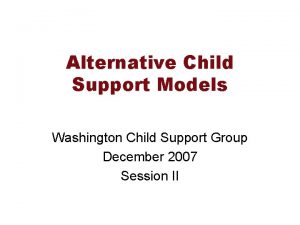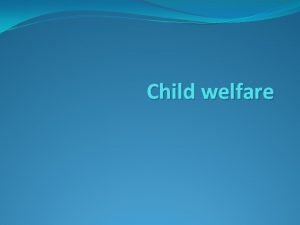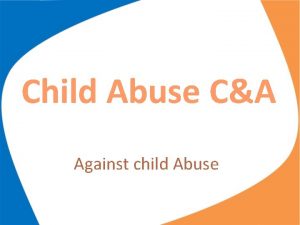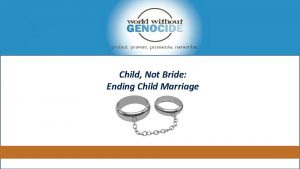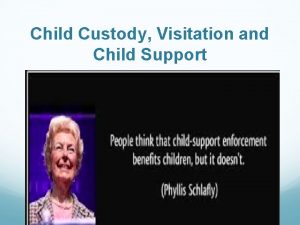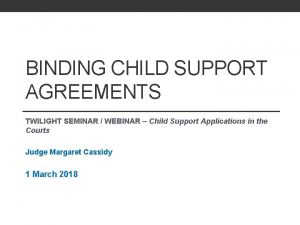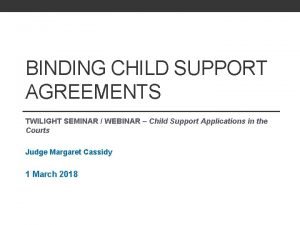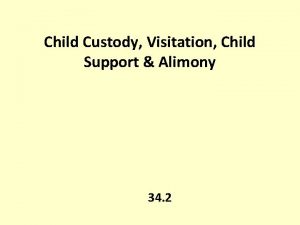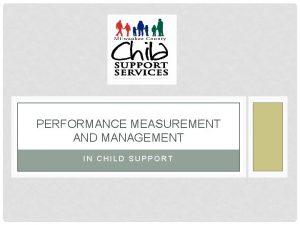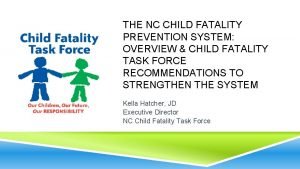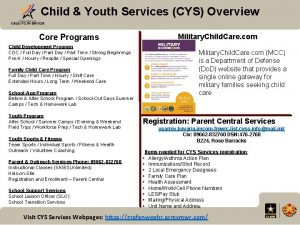CHILD SUPPORT AN OVERVIEW OF THE CHILD SUPPORT






























- Slides: 30

CHILD SUPPORT AN OVERVIEW OF THE CHILD SUPPORT SYSTEM & INNOVATIONS IN CHILD SUPPORT: MODELS & CAMPAIGNS

The Child Support System: An overview of Federal, state, and local child support enforcement.

Section Overview History of the child support system. The role of the Federal OCSE. The role of state child support offices. The role of local child support offices. Stats on child support debt.

Child Support History The child support program was established in 1975. Congress began the child support program to reimburse benefits paid by the government’s welfare programs. Congress made changes the program in 1996 as part of the new welfare reform laws to expand the role of technology and ensure that children receive more of the support paid by their parents.

Role of the Federal OCSE Provide financial support to child support program operations. Fund state level innovations in research, access to visitation, and program improvement. Operate the Federal Parent Locator Service and the National Directory of New Hires. Help with intergovernmental child support cases. Assist states with enforcement services such as federal tax refund intercepts and passport denials.

Role of State Child Support Voluntarily establish legal paternity in the birthing hospital for all children born outside of wedlock. Process income withholding payments for state employers. Provide child support services to children who (1) receive TANF, Federal Foster Care Maintenance payments, or Medicaid, or (2) apply for the following services: Locating parents and financial resources; Establishing paternity and support orders; Establishing and enforcing health care coverage; Enforcing interstate and tribal cases.

Role of Local Child Support Locate non-custodial parents. Establish paternity. Establish and enforce support orders. Modify orders. Collect and pay out child support payments.

Quick Stats on Child Support (CS) Debt CS serves 1 in 2 (50%) of all U. S. children living in poverty. 75% of custodial parents with children living in poverty receive NO CS payments. 25% of non-custodial parents court ordered to pay CS debt have NO income. 31% of non-custodial parents ordered to pay CS debt make below $12, 700 per year. Over 50% of men in U. S. prisons and jails have active CS orders. Median wage of debtors with $1 -149 in arrears is $8, 900. Median wage of debtors with $100, 000 and above in arrears is $4, 470.

Innovations in Child Support: Models & Campaigns

Section Overview Five Evidence-Based Strategies to Increase Regular Child Support Payments Among Low-Income Fathers 1. Right-Sizing Child Support Orders 2. Review and Adjustment of Child Support Orders 3. Debt Compromise 4. Family Distribution (e. g. Paying Families First) 5. Employment Programs More Information: http: //www. acf. hhs. gov/programs/css/resource/alternatives-to-incarceration

Five Evidence-Based Strategies to Increase Regular Child Support Payments Among Low-Income Fathers Right-Sizing Child Support Orders Review & Adjustment of Child Support Orders • Many states have instituted new procedures to establish more realistic child support orders based on parents ability to pay. Setting an income-based order means that parents pay their child support more regularly over time. Where child support orders are not based upon the noncustodial parent’s actual ability to pay, children are less likely to receive support. High debt levels may interfere with parental involvement, increase family conflict, and reduce current support payments. • Using automated income to review and modify child support orders reduces the need to impute income and leads to more accurate orders. Because income often changes significantly over time, it is important to have policies and practices to easily adjust orders to reflect changes in income. Assisting parents in obtaining modified orders when there has been a loss of income, or other change in circumstance, will lead to greater compliance and avoid the unnecessary build up of arrears.

Five Evidence-Based Strategies to Increase Regular Child Support Payments Among Low-Income Fathers Debt Compromise • In FY 2010, child support arrears nationwide reached $110 billion. Research shows that most of these arrears are not collectable. The primary reason child support arrears are so difficult to collect is because most of the arrears are owed by noncustodial parents who have little or no reported income. An estimated 70 percent of the child support arrears owed by noncustodial parents with little or no reported income. Research also suggests that child support arrears might discourage noncustodial parents from working in the formal economy and paying child support. Most state child support agencies have revisited their child support debt compromise policies and implemented promising practices. As of September 2011, the child support program in 24 states and the District of Columbia have implemented a debt compromise program. Family Distribution • Families on Temporary Assistance for Needy Families (TANF) (welfare) must assign their right to receive child support to the government as a condition of receiving cash assistance. Although state governments may choose to pass through child support collected to the TANF family, the majority do not pass through any child support. In 2005, Congress provided incentives to states to distribute more child support to families on welfare. Starting October 1, 2008 state could pass through up to $100 a month of child support to TANF families with one child and up to $200 a month of child support to TANF families with two or more children without reimbursing the federal government its share of the child support collected. If all states expanded pass-through/disregard policies child support to families would more than double. It could cost the federal and state governments less than 1% of TANF costs.

Five Evidence-Based Strategies to Increase Regular Child Support Payments Among Low-Income Fathers Employment Programs • Approximately 25 percent of noncustodial parents have a limited ability to pay child support. Most of these fathers and their nonresident children live in poverty. Traditional child support enforcement tools, such as wage withholding, license revocation, and other administrative actions, are typically unsuccessful with this population, and can undermine employment retention. The underlying problem for some parents is that they face multiple employment barriers and cannot find or maintain a job. To address these issues, states and communities have implemented work-oriented programs for unemployed noncustodial parents who are behind in their child support. As of September 2011, there were at least 28 states with at least 38 work-oriented programs for noncustodial parents in which a child support program was involved. These programs vary in many ways, but the ultimate goal is the same – increase the likelihood that noncustodial parents are working and paying child support. Successful workforce programs reduce the likelihood of civil contempt and are an appropriate alternative to incarceration.

Right-Sizing Child Support Orders: Missouri & Kansas Missouri Incarceration is NOT considered involuntary unemployment and will not trigger an automatic review of a person’s ability to pay child support. However, the State of Missouri has recognized the need to review cases in which a parent is incarcerated on a case by case basis – taking into consideration: How long a person will be incarcerated. The earning potential of the incarcerated parent following release. The amount of the existing child support award. The total amount of child support that will accumulate upon the incarcerated obligor’s release. Kansas Incarceration is NOT considered involuntary unemployment and will not trigger an automatic review of a person’s ability to pay child support. There is no guarantee that the child support will be lowered. It may take several months for the entire modification process to be completed. The State of Kansas has ruled that incarceration is insufficient to justify elimination or reduction of an existing child support obligation. Child support workers make presentations in several state prisons. A pilot project in Greene County Prosecuting Attorney’s Office (Springfield) for that office to screen the judicial cases referred for enforcement for the appropriateness of a review and adjustment. Greene County will initiate the review and modification process judicially at the request of either parent so that the requesting party will not have to participate in a separate administrative process in addition to the judicial process already initiated there in Greene County. No such program/pilot. Few limitations on the use of imputed income in setting child support orders – either when income information is not provided or when a parent is unemployed or underemployed. Few limitations on the use of imputed income in setting child support orders - either when income information is not provided or when a parent is unemployed or underemployed.

Right Sizing Child Support Orders: Promising Practices & Innovations Promising Practices • Using multiple data sources to obtain accurate income information; • Limiting the use of imputed income; • Developing appropriate guidelines for low-income parents; and • Early intervention strategies to engage parents in the child support process such as early conferences with both parents, introductory letters to explain the child support process, courtesy phone calls, and efforts to obtain agreed upon orders. Innovation: Early Intervention and Outreach Strategies • San Francisco County’s Enhanced Parental Involvement Collaboration (EPIC) program used alternative outreach strategies (such as telephone calls) which resulted in more than 70 percent of these cases having noncustodial parent participation in the order establishment process. Innovation: Early Intervention and Outreach Strategies • A Colorado project showed that it was feasible for workers to reach most noncustodial parents at early stages of case processing and that routine attempts to contact and communicate were extremely beneficial. Workerinitiated outreach was associated with a significant reduction in default orders and an increase in those established by stipulation (consent of both parents). And, workers were more likely to identify income using objective data sources and parent affidavits in cases where they had telephone and/or in-person contact with noncustodial parents.

Right Sizing Child Support Orders: Promising Practices & Innovations Innovation: Early Intervention and Outreach Strategies • Tennessee’s 4 th District expanded its “phone tree system” which makes automated phone calls to customers to remind the of court dates, office appointments and payment due dates. One of the most helpful results from the phone tree system was discovering telephone numbers no longer in use. • Also, early intervention techniques include appointments with customers and introductory letters to explain the child support process, courtesy phone calls, intense efforts to obtain agreed upon orders and phone contact numbers. • Tennessee's 4 th District imaged all case files so that staff will no longer need to use paper files to complete their work and will reduce storage needs and case information will literally be at the finger tips of the staff via computer.

John S. Martinez Fatherhood Initiative: Connecticut’s Fatherhood Initiative is a broad-based, statewide program led by the Department of Social Services that is focused on changing the systems that can improve fathers’ ability to be fully and positively involved in the lives of their children. Two Highlights of Project: Ø Statutory change to insure that support orders are based on noncustodial parent’s actual (as opposed to imputed) earnings. Ø Launched an initiative to assist fathers who are incarcerated to seek modification of orders before arrears accumulate; Judicial branch developed an expedited process for review of over such cases and facilitated transport of inmates to court so modification matters can be addressed.

Review & Adjustment of Child Support Orders: Missouri & Kansas Missouri Kansas Resources for Noncustodial Parents: • No online forms available for submitting an application to modify a child support order. • Frequently Asked Questions website page: http: //dss. mo. gov/cse/index. htm Resources for Noncustodial Parents: • No online forms available for submitting an application to modify a child support order. • Child Support Handbook for Incarcerated Parents: https: //www. acf. hhs. gov/sites/default/files/programs/css/ks_cs_ order. pdf • Child Support Services Handbook: http: //www. dcf. ks. gov/services/CSS/Documents/CSS 5000 Web. Ve rsion. pdf Grounds for Modification in MO: Parents can request a modification when there has been a change in circumstances after 3 years from the date of the most recent order. Parents can seek a review and modification earlier than 36 months if a parent demonstrates a 50 percent or more involuntary decrease in either party’s income or a 50 percent or more increase in either party’s income. Grounds for Modification in KS: Parents can request a modification when there has been a change in circumstances which would result in a 10% change in the child support amount or after 3 years from the date of the most recent order. In setting child support orders, MO law requires the court to consider “all relevant factors, including, but not limited to: the needs of the child; the standards of living and circumstances of the parents; the relative financial means of the parents; the need and capacity of the child for education; the age of the child; the financial resources and earning ability of the child; the responsibility of the parents for the support of others; and the value of services contributed by both parents. ” (L. 1987 S. B. 328 § 15, A. L. 1993 S. B. 253, A. L. 1997 S. B. 361) HB 2568 (July 1, 2014): In setting child support orders, the bill requires the court to consider “all relevant factors, including, but not limited to: the needs of the child; the standards of living and circumstances of the parents; the relative financial means of the parents; the need and capacity of the child for education; the age of the child; the financial resources and earning ability of the child; the responsibility of the parents for the support of others; and the value of services contributed by both parents. ” The bill allows the court to make a modification of child support retroactive to the first day of the month following the filing of the motion to modify.

Review & Adjustment of Child Support Orders: Promising Practices & Innovations Promising Practices Innovation: Automated Review & Adjustment • Using automated review and adjustment via electronic systems and technology; • Making online forms available for parents to request a modification; • Targeting newly unemployed noncustodial parents for a streamlined or expedited review; • Instituting procedures to receive a modification for a temporary period of time; • Developing outreach materials to encourage parents to seek modifications when they have experienced a significant change in circumstances. • The Alaska Child Support Services’ electronic modification function (ELMO) uses income information from sources linked electronically to its automated child support system to review all current child support order amounts ANNUALLY. If the system finds income information for four consecutive quarters, it conducts a guidelines calculation. If the calculation results in at least a 15 percent difference in the order amount, ELMO targets that order for a manual review. • Iowa passed legislation in 2010 to allow the Child Support Recovery Unit to move forward on Review and Adjust processes more quickly by shortening the waiting periods in regular modification reviews from 30 days to 15 days.

Review & Adjustment of Child Support Orders: Promising Practices & Innovations Innovation: Use of Technology Innovation: Temporary Modifications • Texas enhanced its website to make it easier for noncustodial parents to request a review and adjustment of their order. Parents may complete a questionnaire available on the child support section of the main website. Parents can download the form and send it to the child support office handling their case. • Temporary Employment Related Modifications. In 2009, Oregon passed laws that allow for a temporary adjustment to the child support order. Temporary order modifications change the basic support obligation for up to 6 months if one or both parents in the order have suffered loss of income.

R. O. L. E. Pilot & Campaign: Center for Urban Families • Pilot project in Baltimore City targeting 4 zip codes • If fathers complete classes they get credit toward state-owed arrearage: • Responsible Fatherhood: 15% • STRIVE (workforce development): 10% • Fathers who pay their child support for 12 months continuously get 50% reduction in state-owed arrearage • Fathers who pay their child support for 24 months continuously get a 100% reduction in state-owed arrearage. KEY COMPONENTS: • Letters sent to fathers (with CFUF’s logo) • Fathers meet child support officials at CFUF’s offices • No arrest clause

Debt Compromise: Missouri & Kansas Missouri Kansas No Child Support Debt Compromise Program. In an effort to reach hard-to-serve men, the Kansas Dept. of Children & Families (DCF) instituted a state-owed child support arrears forgiveness program based on a level of commitment to the Connections to Success program. Specifically, a $50 arrears forgiveness is accrued for each hour of program participation up to a cap of $2, 000. Based on its success, DCF has extended this plan to include educational and vocational training achievements No Child Support Debt Compromise Program. Kansas Child Support Services has partnered with the Kansas Treasurer's Office to allow noncustodial parents to open a 529 savings account for their children and have their State assigned child support arrears reduced by double the amount deposited. As long as the noncustodial parent meets the requirements, every dollar deposited into the 529 account for the child will result in Child Support Services reducing the State arrears by two dollars. Arrears due and owed to the custodial parent/custodian will not be reduced. Part of Governor’s Task Force on Reducing Child Poverty.

Debt Compromise: Promising Practices & Innovations Promising Practices Innovation: Settlement Program Innovation: Incentive Program • Debt compromise programs fall into three program types: settlement programs, incentive programs, or a hybrid approach. • California’s Compromise of Arrears Program (COAP) is the largest debt compromise program in the country. The noncustodial parent must owe the government at least $500 in arrears and he/she cannot pay off the entire arrears balance in three years, but he/she can pay off arrears owed to the family and the negotiated amount of state-owed arrears in three years. The child support program contacts the custodial parent if arrears are owed to the family and asks if the custodial parent is willing to compromise family-owed arrears. If the custodial parent does not agree to a compromise, the full amount of the family-owed arrears must be paid as part of the COAP agreement. The local child support program monitors the agreement. If the noncustodial parent does not adhere to the terms of the agreement, the local child support program provides written notice to the noncustodial parent and files a rescission notice with the court. • Wisconsin conducted a pilot debt compromise program called Families Forward from 2005 to 2007 in Racine County. Families Forward reduced state-owed debt by 50 cents for every dollar of current support paid. Participants were allowed to participate in the program for two years, regardless of their payment behavior as long as they did not go without paying current support for six consecutive months. In addition, interest was not assessed on arrears during program participation. Eligibility was limited to noncustodial parents who had owed at least $2, 000 in arrears, had a recent history of nonpayment, and had a case in Racine County.

Family Distribution: Missouri & Kansas: No Pass-Through or Disregard of Child Support

Family Distribution: Innovations Innovation: Maximize Pass Through Reimbursable by Federal Government Innovation: 100% Percent Pass Through • In Washington State they expanded their disregard policy to the maximum amount incentivized by the federal government - $100 for one child/$200 for two or more children is passed through and disregarded. • Although the federal government will only share in the cost of passing through child support to TANF families up to $100 for one child and $200 for two or more children, states could pass through all the child support collected on behalf of TANF families. If they did, TANF families that receive child support would receive an average of $1, 230 a year in child support, representing 8 percent of their income.

Illinois Campaign: Increase Child Support Pass Through to Families Fathers, Families, and Healthy Communities (FFHC) is working group of: social service and community development practitioners; applied researchers; and public policy experts - http: //www. ffhc. org/ Championed Illinois Senate Bill 3216 Bill directs that up to the first $100 of child support collected each month for one child and up to $200 collected for two or more children be passed through to the families without decreasing their TANF benefit amounts.

Employment Programs: Missouri & Kansas Missouri Kansas Jackson, MO: The Child Support Court in Kansas City is modeled after the drug court there. The Child Support Court works with noncustodial parents who were charged with criminal non-support who are later identified as struggling with alcohol, drugs, and/or employment and mental health issues. The Court’s case manager uses community agencies and programs to assist noncustodial parents with re-establishing relationships with their children, teaching responsibility, and addressing financial barriers. This program was expanded statewide by the legislature – funding not available. Kansas City: Connections to Success is a community-based organization that offers an employment/responsible fatherhood program in Kansas City. Services provided by the program include intensive case management, responsible parenting and healthy relationship education, skill building, financial education, mentoring, St. Louis: The Father Support Center is a community-based organization that provides comprehensive services to fathers who want to become more financially and emotionally involved with their children. It received an OFA Responsible Fatherhood grant, which ends September 30, 2014. The Missouri child support program is actively involved in this project. It provides individualized child support services to its participants, gives presentations to fatherhood classes, and is a resource for Center staff. job readiness, job search assistance, and job placement.

Employment Program: Innovations Innovation: Recycle. Force Transitional Jobs Program Innovation: Milwaukee • Arrearage payments reduced to $1 per week while working at Recycle. Force, then rose to only $10 per week post-Recycle. Force employment as long as child support was paid regularly. In Indiana, driver’s licenses are routinely suspended for having a child support arrearage. All drivers’ licenses suspended due to child support arrearage were reinstated. • Forgiveness of interest on arrears at key benchmark points in program participation is built into the program model. • The program connects participants with a representative from Legal Action, which helps participants with order modifications and with confirming forgiveness of interest on arrears. • Onsite child support representative, who supports the program by confirming orders during eligibility determination and by facilitating the ability of the participants and Legal Action to access information on orders, arrears balances, and other information.

Common Threads to Successful Campaigns § Engaging fathers as part of solution. § Strong vision and goal. § Data and research. § Leveraging or Creating Coalitions/Task Forces/Working Groups. § Relationships w/ Decision-Makers. § § Members of State Legislator State Agency Representatives Courts Judges

Get Connected. Stay Connected. Sign up for newsletters: www. transitionaljobs. net Email us: myoung@heartlandalliance. org jajones@heartlandalliance. org Follow us: National Transitional Jobs Network @tjprograms @NTJN_Melissa
 Fungsi dexcom
Fungsi dexcom Sơ đồ cơ thể người
Sơ đồ cơ thể người Cong thức tính động năng
Cong thức tính động năng Số nguyên tố là
Số nguyên tố là đặc điểm cơ thể của người tối cổ
đặc điểm cơ thể của người tối cổ Tỉ lệ cơ thể trẻ em
Tỉ lệ cơ thể trẻ em Các châu lục và đại dương trên thế giới
Các châu lục và đại dương trên thế giới ưu thế lai là gì
ưu thế lai là gì Thẻ vin
Thẻ vin Các môn thể thao bắt đầu bằng tiếng đua
Các môn thể thao bắt đầu bằng tiếng đua Tư thế ngồi viết
Tư thế ngồi viết Cái miệng nó xinh thế chỉ nói điều hay thôi
Cái miệng nó xinh thế chỉ nói điều hay thôi Hình ảnh bộ gõ cơ thể búng tay
Hình ảnh bộ gõ cơ thể búng tay Từ ngữ thể hiện lòng nhân hậu
Từ ngữ thể hiện lòng nhân hậu Tư thế ngồi viết
Tư thế ngồi viết Trời xanh đây là của chúng ta thể thơ
Trời xanh đây là của chúng ta thể thơ V cc
V cc Gấu đi như thế nào
Gấu đi như thế nào Thể thơ truyền thống
Thể thơ truyền thống Hổ sinh sản vào mùa nào
Hổ sinh sản vào mùa nào đại từ thay thế
đại từ thay thế Thế nào là hệ số cao nhất
Thế nào là hệ số cao nhất Diễn thế sinh thái là
Diễn thế sinh thái là Vẽ hình chiếu vuông góc của vật thể sau
Vẽ hình chiếu vuông góc của vật thể sau Slidetodoc
Slidetodoc Thế nào là mạng điện lắp đặt kiểu nổi
Thế nào là mạng điện lắp đặt kiểu nổi Mật thư tọa độ 5x5
Mật thư tọa độ 5x5 Lời thề hippocrates
Lời thề hippocrates Tư thế worm breton là gì
Tư thế worm breton là gì Vẽ hình chiếu đứng bằng cạnh của vật thể
Vẽ hình chiếu đứng bằng cạnh của vật thể Quá trình desamine hóa có thể tạo ra
Quá trình desamine hóa có thể tạo ra
































